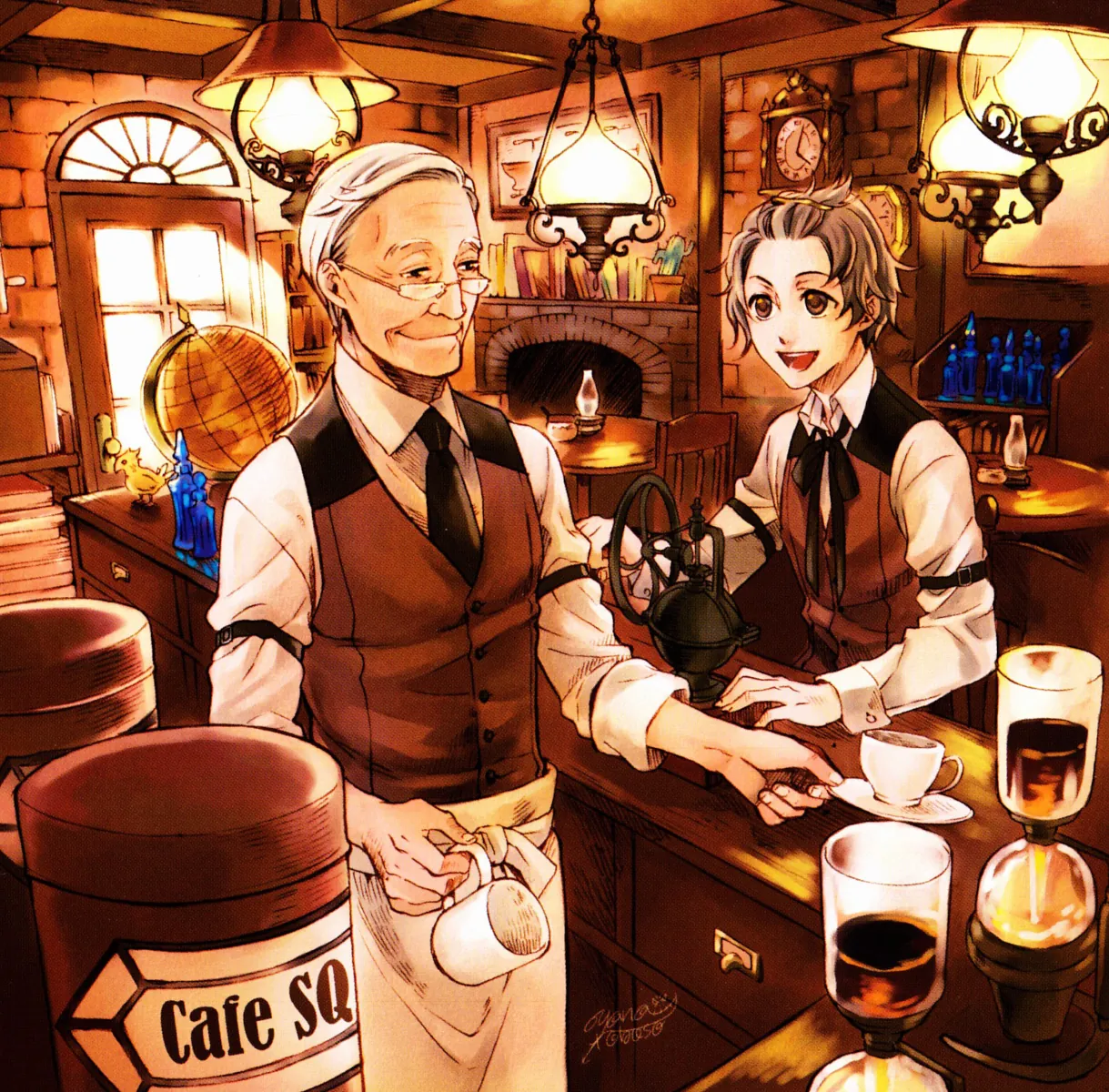Square Enix seems to be exhausting every possible take on their franchises’ music, but who can blame them? With timeless contributions from composer legends Mitsuda and Uematsu, the well remains full and coppery. As us third to fifth generations get a little older and start our careers, so too begins coffee addiction (at least for me, thank you, Japan). What better way to enjoy a cuppa than with the woody renditions of Cafe SQ, a soundtrack sure to satiate lovers of string and woodwind.
Cafe SQ kicks off with the soft scratch of an old phonograph during a music box take on Final Fantasy V‘s “My Home, Sweet Home.” Mellow throughout, this track sets the tone for the album with acoustic guitar, Celtic woodwinds, and piano. Images of sitting outside on a warm, breezy summer afternoon along the cobblestone street of a sienna cafe instantly come to mind. The piece declares, “Don’t expect heart-pumping battle music here, friend.”
Though, friends, one can expect the whimsy of a chocobo tune. Woodwinds promised, a double reed of some sort plays the opening melody with a—you guessed it—tuba to signify our tubby chocobo companion as hinted by the track’s title: “Chocobo’s Theme ~ Fat Chocobo Appears.” The silly-tude continues with bass drums, viola, accordion, and acoustic. A picture immediately comes to mind with the sheer volume of instrumentation using long, drawn-out notes, as if the music is desperately trying to match the girth of our carrot-loving, feathery friend.
Here, I split hairs as I laud “Jolly Ol’ Spekkio” and “Johnny C. Bad” as toe-tappin’, finger-snappin’, head-shakin’ beats that take hold of the senses and kick you out of your body for a moment. The former enjoys a sort of cocktail on the beach feel with its bevy of percussion and light horns, while the latter limit breaks into full-on jazz with brass, drums, standing bass, and clapping. I have to say, while “Johnny C. Bad” stands as one of the weaker parts of Final Fantasy VI‘s collection of awe-inspiring tunes, this cover might have actually altered the beating of my heart for three minutes.
Fans of Xenogears, don’t fret—this awesome title has not been omitted, nor has it been completely shadowed by the franchise that won’t die. Sporting almost eleven minutes of masterful, dramatic piano performance, “Xenogears Suite” plays an assortment of some of the game’s best music. Admittedly, this track sticks out from the rest of the soundtrack, not quite fitting the theme, but I find it hard to argue against its presence with such emotional key tapping. Though I can’t recognize the name of every tune played, I am familiar with the sound, and the selection is fantastic. Mitsuda fans rejoice. My personal favorite part occurs at 4:15.
My absolute favorite track, however, is the last: “Troian Beauty.” I must say that I am a little biased, though, since this is my favorite piece from Final Fantasy IV, a most under-appreciated theme in my humble opinion. Standing bass meets hot ivory and drums to form a dynamic five minutes. The opening and closing are resoundingly familiar, while the middle takes off unapologetically into its own thing. This jazzy piece closes Cafe SQ well and true.
Writing this review was difficult, because nearly every track maintains the theme, and all of the tunes are masterfully played. To those rolling their eyes at yet another Square Enix album revisiting Uematsu and Mitsuda’s work, keep your optics in check, because this compilation revisits the themes faithfully, yet takes off into its own style to create a unique and welcomed sound. While several of Square Enix’s cover albums lately have been lukewarm at best, this one stands above the rest, and I highly recommend it to anyone who yearns for a fresh take on the overdone legends of the industry.




